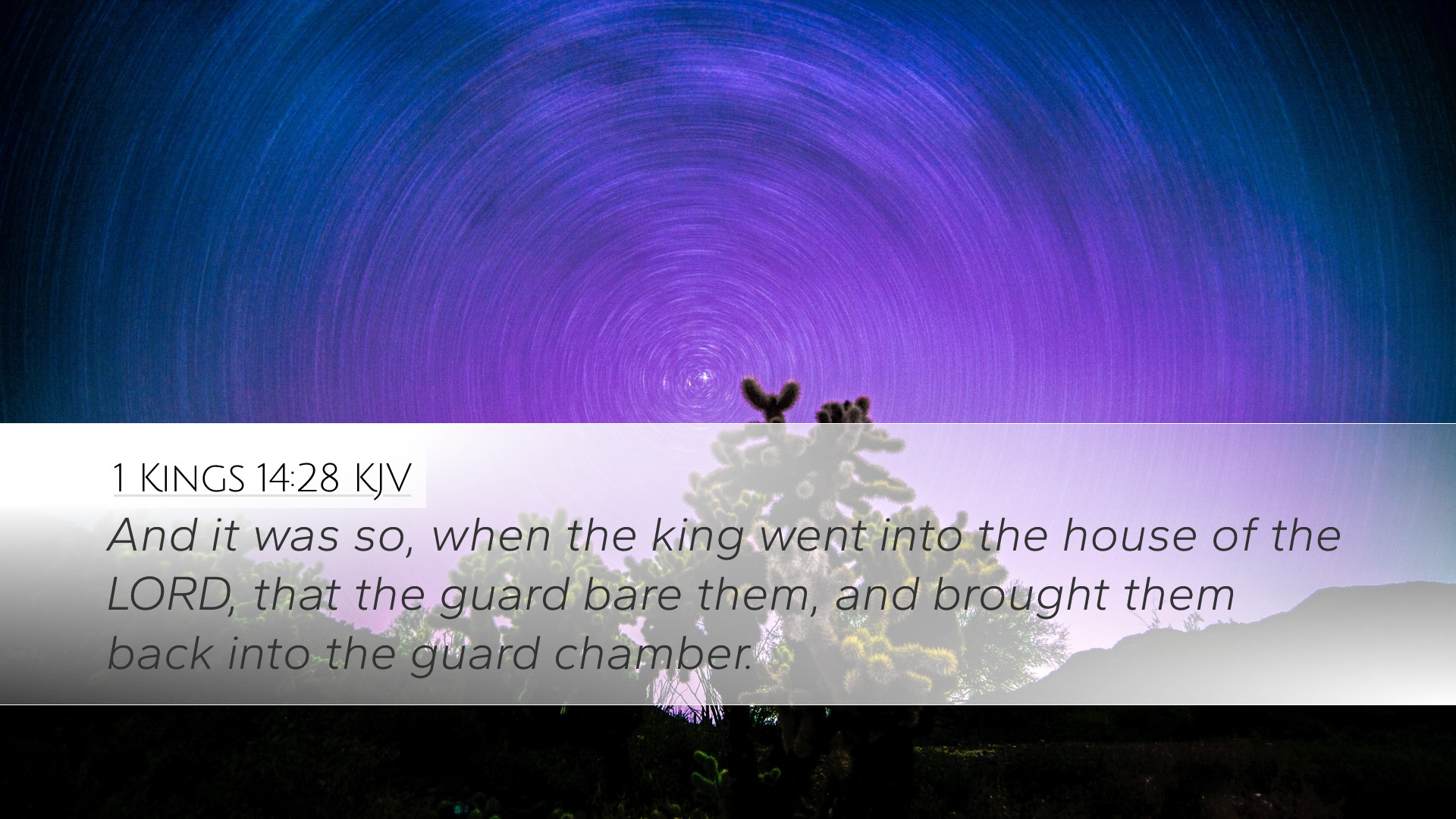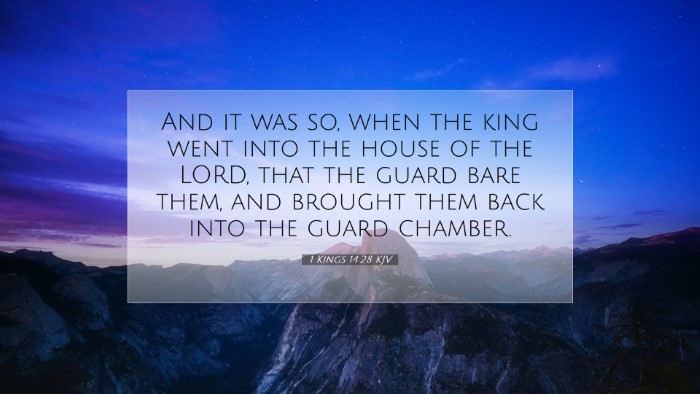Commentary on 1 Kings 14:28
Verse Text: "And it was so, when the king went into the house of the Lord, that the guard bare them, and brought them back to the guard-chamber."
Introduction
This verse encapsulates a significant moment during the reign of King Abijah, son of Jeroboam. It highlights the role of the guards in the Temple, the interaction of the king with the sacred, and the implications of such actions. This commentary draws upon insights from renowned public domain commentaries by Matthew Henry, Albert Barnes, and Adam Clarke, dissecting this episode's theological and historical relevance.
Contextual Background
In the broader narrative of 1 Kings, chapters 12 to 14 depict the division of Israel into the northern and southern kingdoms. Jeroboam, fearing the loss of his rule, established alternative forms of worship outside Jerusalem. This context sets the stage for understanding the significance of the king's actions as he approaches the house of the Lord.
Theological Significance
The details surrounding the actions of the king and the guards reveal profound theological implications:
- Temple Worship: The guard's role in carrying the offerings points toward the elevated status of the Temple. It was viewed as the dwelling place of God, thus highlighting the sanctity and reverence required in approaching the Divine.
- Symbolism of Authority: The act of the king entering the house of the Lord symbolizes an acknowledgment of God's authority and a recognition of the need for divine favor in leadership.
- Guardians of the Sacred: The guards symbolize the boundary between the sacred and the profane. Their actions reflect the seriousness with which sacred duties are to be approached.
Insights from Matthew Henry
Matthew Henry comments on the king's entry into the house of the Lord as a necessary act of reverence that must be accompanied by true repentance and recognition of one's failures. Henry suggests that while Jeroboam's lineage may have strayed from God's commandments, there remained an opportunity for Abijah to turn back to God, making such an act significant.
Henry also emphasizes the role of the guards, interpreting their function as protectors of holy things. Their duty to carry offerings signifies the weight of accountability upon those who serve in sacred spaces, reminding leaders that their actions bear witness to their faith.
Insights from Albert Barnes
Albert Barnes focuses on the idea of respect for the holy place and the traditions surrounding it. He notes that the temple was the center of Israelite worship and thus the site of crucial national identity. Barnes argues that the king's visit represents an overt acknowledgment of the influence the Temple held over the people and their leaders.
Furthermore, Barnes sheds light on the guards' actions as symbolic of the unapproachable nature of God’s holiness, suggesting that only through specific acts of reverence could one approach the divine, serving as a foreshadowing of the New Testament understanding of Christ as the ultimate mediator.
Insights from Adam Clarke
Adam Clarke takes a historical approach by situating this passage within the larger context of Israel's monarchy, reflecting on the development of worship practices during Jeroboam's reign. He notes that the actions and rituals in the Temple were essential for governmental legitimacy and the authority of the king.
Clarke stresses the importance of understanding the temple's protocols. He interprets the guards' carrying of the offerings as adherence to regulations that maintain the sanctity of the worship space, reinforcing the concept that holiness is not to be taken lightly.
Lessons for Contemporary Leaders
This passage serves as a poignant reminder for today’s leaders and scholars regarding the necessity of maintaining reverence for God in their ministry and governance:
- Accountability: Like the guards, leaders are reminded of their accountability before God, signifying that they must lead with integrity and reverence.
- Divine Acknowledgment: Approaching sacred spaces necessitates a recognition of God's sovereignty and a humble heart.
- Respect for Tradition: Understanding and respecting the practices that have shaped worship across generations can deepen faith and community identity.
Conclusion
In summary, 1 Kings 14:28 serves as a crucial narrative reflecting the intertwining of political leadership, sacred worship, and communal identity in ancient Israel. The verses underscore the necessity of reverence for the divine and the reminders of one's responsibilities as leaders in the context of God's presence. This commentary synthesizes the insights from Matthew Henry, Albert Barnes, and Adam Clarke to draw out the rich theological and practical lessons embedded within this text. May today’s readers apply these insights within their faith communities, recognizing God's enduring relevance across time and the sacred nature of their leadership roles.


